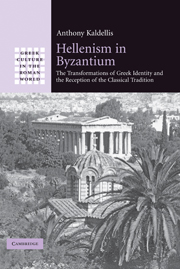 Hellenism in Byzantium
Hellenism in Byzantium Book contents
- Frontmatter
- Contents
- Preface
- Introduction
- PART I GREEKS, ROMANS, AND CHRISTIANS IN LATE ANTIQUITY
- PART II HELLENIC REVIVALS IN BYZANTIUM
- 4 Michael Psellos and the instauration of philosophy
- 5 The Third Sophistic: the performance of Hellenism under the Komnenoi
- 6 Imperial failure and the emergence of national Hellenism
- General conclusions
- Bibliography
- Index
5 - The Third Sophistic: the performance of Hellenism under the Komnenoi
Published online by Cambridge University Press: 24 December 2009
- Frontmatter
- Contents
- Preface
- Introduction
- PART I GREEKS, ROMANS, AND CHRISTIANS IN LATE ANTIQUITY
- PART II HELLENIC REVIVALS IN BYZANTIUM
- 4 Michael Psellos and the instauration of philosophy
- 5 The Third Sophistic: the performance of Hellenism under the Komnenoi
- 6 Imperial failure and the emergence of national Hellenism
- General conclusions
- Bibliography
- Index
Summary
ANATHEMA UPON PHILOSOPHY
A lone philosopher in an age of opportunity, Psellos opened up many fronts in his struggle to establish Hellenism at the heart of Byzantine intellectual life. His revolutionary project aimed to set metaphysics, science, ethics, and literature on a new basis whose foundations had been laid by the ancient Greeks. Though he had allies, students, and friends, as well as enemies, his contemporary impact cannot be gauged. It seems to have been limited, to judge from the silence that surrounds him. Modern references to “the eleventh-century revival of letters” should be treated with caution: without Psellos, the eleventh century would be one of the bleakest in Byzantine secular literature. The previous chapter took the form of an exposition of his ideas because he was the sole prophet of Hellenism in his age.
The revolutionary philosophy of one century is often the common sense of the next. This chapter is about Psellos' twelfth-century heirs, whose Hellenisms were blocked in some respects and facilitated in others. Through well-publicized prosecutions, the Komnenian regime discouraged the pursuit of a key aspect of Psellos' project, metaphysics, even while in other ways it was encouraging the development of the Hellenic sites of the culture. Komnenian society happened to evolve in a way that made the cultivation of Hellenism into a powerful trend. Psellos' heirs, a few dozen men and one woman, participated in this enterprise without necessarily sharing his philosophy or even knowing its revolutionary objectives.
Information
- Type
- Chapter
- Information
- Hellenism in ByzantiumThe Transformations of Greek Identity and the Reception of the Classical Tradition, pp. 225 - 316Publisher: Cambridge University PressPrint publication year: 2008